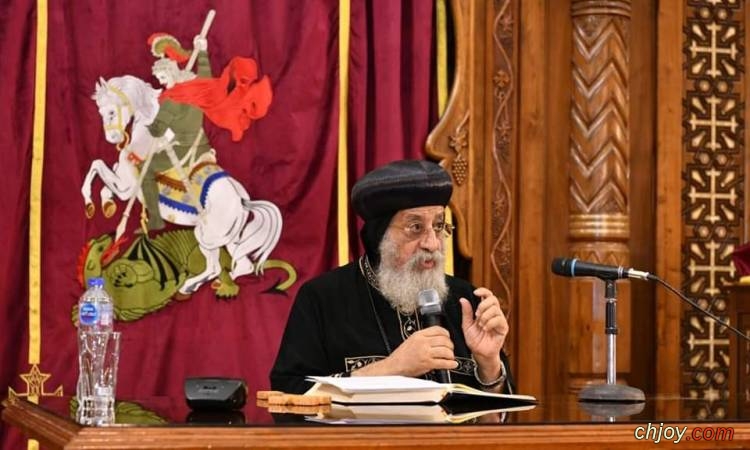
 |
 |
 |
 |
|
رقم المشاركة : ( 1 )
|
|||||||||||
|
|||||||||||
 قداسة البابا تواضروس الثاني Editorial Article by H.H. Pope Tawadros II in Kiraza Magazine: The Most Dangerous Fire In human history, fire is considered one of the components of the theory of the four elements: water, air, fire, and earth. This article does not refer to “physical fire” that destroys and burns everything to ash, such as wildfires caused by material or environmental factors like climate change-induced forest fires or volcanic eruptions that spew destructive lava and ash. Rather, this article refers to moral fire, ignited by the tongue, as described by St. James the Apostle in his letter: “And the tongue is a fire, a world of iniquity” (James 3:6 NKJV). In the Old Testament, Proverbs also states, “Death and life are in the power of the tongue” (Proverbs 18:21). Humans, as speaking beings, communicate through speech, listening, reading, and writing. These forms of communication underpin human civilization, distinguishing us from other living beings like plants and animals that lack these multiple forms of communication and cannot build a civilization comparable to those throughout human history. The importance of the tongue, likened to fire, lies in its power to influence, build, and destroy; “With it we bless our God…, and with it we curse men, who have been made in the similitude of God” (James 3:9). St. James the Apostle dedicates a whole chapter to describing the tongue, attributing various qualities to it: A small member that boasts great things, a world of iniquity, defiles the whole body, sets the course of nature on fire, is set on fire by hell, uncontrollable evil, full of deadly poison, and so on. But above all these traits, it is considered “a real fire” that can ignite souls, hearts, and minds, burning, consuming, and destroying, thus misusing the tongue may negatively impact many. A corrupt tongue speaks lies, deceit, hypocrisy, slander, and gossip; it is compared to a serpent (Psalm 140:3), a sharp razor (Psalm 52:2), a sharp sword (Psalm 57:4), and a deadly arrow (Jeremiah 9:7, 18:18). Throughout history, the tongue’s lies have been like evil arrows igniting fires between individuals, groups, nations, and peoples, as warned in the final book of the Bible, Revelation, when it described the eight categories of people who do not enter into the presence of God: “But the cowardly, unbelieving, abominable, murderers, sexually immoral, sorcerers, idolaters, and all liars shall have their part in the lake which burns with fire and brimstone, which is the second death” (Revelation 21:8). This warning is reiterated in the final chapter: “Outside are dogs and sorcerers and sexually immoral and murderers and idolaters, and whoever loves and practices a lie” (Revelation 22:15). With the proliferation of social media platforms and billions of mobile devices worldwide in the hands of kids and adults, falsehoods in all forms and shapes have become prevalent in today’s world. Lying at all levels, from international and local news to scams and thefts among individuals and groups, the “human tongue” has found its ingenious means of transmitting and disseminating it. We also hear about cybersecurity that aims to protect data from being falsified or stolen and misused across various fields. In the early Christian Church, after Pentecost, the Bible records the story of Ananias and his wife Sapphira as a stark example of lying and hiding the truth out of greed for money, honor, and fame. However, the punishment was severe as they died because of their lie (Acts 5:1-11). Today, lying has become alarmingly common in news, art, recordings, videos, and other media. Artificial intelligence has entered this field, making it more difficult to distinguish between what is true and what is false. The first lie in any matter leads to a second, then a third, until “smooth lying” gradually dulls the conscience, making a person without moral sense, living in a world full of and breathing in deceit, fraud, and delusion. One of the manifestations of the tongue’s fire is when some websites describe a person as “a heretic.” This harsh accusation describes someone who invents false and deviant statements about faith and doctrine. However, issuing such an accusation concerning the integrity of faith is not the right of any individual, just as only a judge has the authority to issue a ruling against an accused person. A single person judging someone as “a heretic” in this way, spreads a fire around them that quickly spreads without verification or investigation. The only body that has the right to label someone as “a heretic” is the Holy Synod of the Church, by consensus of its members and after thorough investigations that allow the person the opportunity to defend themselves. Writings and websites that use their tongues to issue such labels or others about any person, ignite the most dangerous and destructive fire, ruining the lives of individuals and their families. My friend, your tongue is a fire when you use it for lies and deceit against others. Know that by your words you will be justified, and by your words you will be condemned. Beware of this fire that is not easily extinguished but extends from age to age. Do not participate in such lies, for if you do, you will lose your heavenly share. Let those who have ears hear and beware. |
 |
|
| قد تكون مهتم بالمواضيع التالية ايضاً |
| الموضوع |
| Papal Message of Resurrection Feast 2025 |
| The Papal Encyclical of the Glorious Feast of Resurrection |
| The Papal Encyclical of the Glorious |
| Glorious Feast of the Pentecost |
| The Glorious Resurrection |